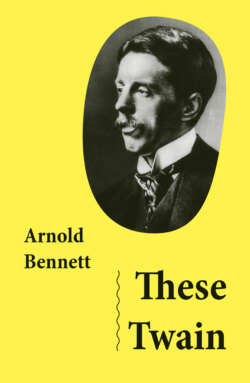Читать книгу These Twain (Unabridged) - Arnold Bennett - Страница 11
На сайте Литреса книга снята с продажи.
iii
ОглавлениеShe stood at the turn of the stairs, waiting while the front-door was opened. He and George could see her over and through the banisters. And at sight of her triumphant and happy air, all Edwin’s annoyance melted. He did not desire that it should melt, but it melted. She was late. He could not rely on her not to be late. In summoning the parlourmaid to her bedroom when the parlourmaid ought to have been on duty downstairs she had acted indefensibly and without thought. No harm, as it happened, was done. Sheer chance often thus saved her, but logically her double fault was not thereby mitigated. He felt that if he forgave her, if he dismissed the charge and wiped the slate, he was being false to the great male principles of logic and justice. The godlike judge in him resented the miscarriage of justice. Nevertheless justice miscarried. And the weak husband said like a woman: “What does it matter?” Such was her shameful power over him, of which the unscrupulous creature was quite aware.
As he looked at her he asked himself: “Is she magnificent? Or is she just ordinary and am I deluded? Does she seem her age? Is she a mature woman getting past the prime, or has she miraculously kept herself a young girl for me?”
In years she was thirty-five. She had large bones, and her robust body, neither plump nor slim, showed the firm, assured carriage of its age. It said: “I have stood before the world, and I cannot be intimidated.” Still, marriage had rejuvenated her. She was marvellously young at times, and experience would drop from her and leave the girl that he had first known and kissed ten years earlier; but a less harsh, less uncompromising girl. At their first acquaintance she had repelled him with her truculent seriousness. Nowadays she would laugh for no apparent reason, and even pirouette. Her complexion was good; he could nearly persuade himself that that olive skin had not suffered in a decade of distress and disasters.
Previous to her marriage she had shown little interest in dress. But now she would spasmodically worry about her clothes, and she would make Edwin worry. He had to decide, though he had no qualifications as an arbiter. She would scowl at a dressmaker as if to say: “For God’s sake do realise that upon you is laid the sacred responsibility of helping me to please my husband!” To-night she was wearing a striped blue dress, imperceptibly décolletée, with the leg-of-mutton sleeves of the period. The colours, two shades of blue, did not suit her. But she imagined that they suited her, and so did he; and the frock was elaborate, was the result of terrific labour and produced a rich effect, meet for a hostess of position.
The mere fact that this woman with no talent for coquetry should after years of narrow insufficiency scowl at dressmakers and pout at senseless refractory silks in the yearning for elegance was utterly delicious to Edwin. Her presence there on the landing of the stairs was in the nature of a miracle. He had wanted her, and he had got her. In the end he had got her, and nothing had been able to stop him—not even the obstacle of her tragic adventure with a rascal and a bigamist. The strong magic of his passion had forced destiny to render her up to him mysteriously intact, after all. The impossible had occurred, and society had accepted it, beaten. There she was, dramatically, with her thick eyebrows, and the fine wide nostrils and the delicate lobe of the ear, and that mouth that would startlingly fasten on him and kiss the life out of him.
“There is dear Hilda!” said someone at the door amid the arriving group.
None but Auntie Hamps would have said ‘dear’ Hilda. Maggie, Clara, and even Janet Orgreave never used sentimental adjectives on occasions of ceremony.
And in her clear, precise, dominating voice Hilda with gay ease greeted the company from above:
“Good evening, all!”
“What the deuce was I so upset about just now?” thought Edwin, in sudden, instinctive, exulting felicity: “Everything is absolutely all right.”
